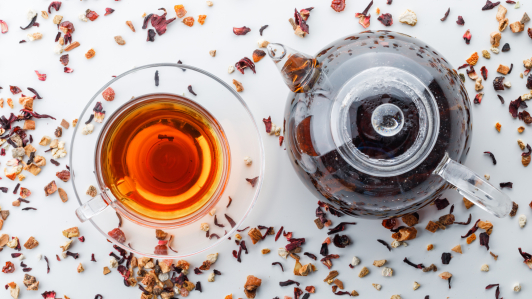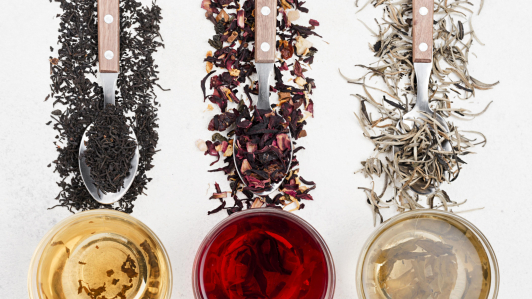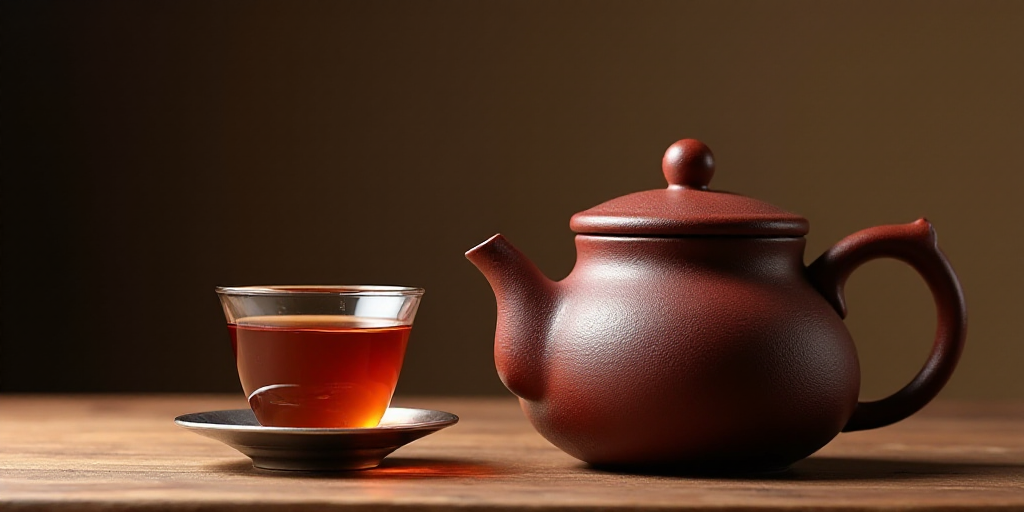Celebrate International Tea Day with These Stress-Relieving Recipes
International Tea Day, celebrated on May 21st, encourages us to look beyond the cup and appreciate tea as a culture, ritual, and natural remedy. Among the many benefits of true teas—green, white, oolong, black, and pu-erh—one of the most valuable is its impact on stress.
Unlike pure stimulants like coffee, tea offers a balance between energy and calm due to an exclusive amino acid called L-theanine, which promotes alpha brain waves associated with meditative and deep relaxation states. Additionally, the caffeine in tea is released more gradually, avoiding anxiety spikes. The simple act of preparing a cup of tea—measured, slow, and aromatic—functions as an intentional pause amidst chaos.
Preparation Tips:
- 1 teaspoon of green tea
- 5 fresh mint leaves
- 1 slice of lemon
- Infuse in 250 ml of water at 80°C for 2-3 minutes.
This tea is perfect for starting your day in balance or for a “reset” after an intense day.
1. Green Tea with Mint and Lemon
Why does it calm?
- Green tea, being the least processed with low caffeine and high in polyphenols, combats oxidative stress. Meanwhile, lavender acts on the parasympathetic nervous system, reducing heart rate and promoting emotional serenity.
Preparation:
- 1 teaspoon of white tea
- ¼ teaspoon of dried lavender flowers
- Infuse in water at 75°C for 3 minutes. Strain and serve.
This combination is ideal for those afternoons when you need to unwind both body and mind without losing focus.

Teas for Stress
2. White Tea with Lavender
Why does it calm?
- White tea, being the least processed with low caffeine and high in polyphenols, combats oxidative stress. Lavender, on the other hand, acts on the parasympathetic nervous system, reducing heart rate and promoting emotional serenity.
Preparation:
- 1 teaspoon of white tea
- ¼ teaspoon of dried lavender flowers
- Infuse in water at 75°C for 3 minutes. Strain and serve.
This is the perfect combination for those afternoons when you need to unwind both body and mind without losing focus.
3. Oolong Tea with Rose Petals
Why does it calm?
- Oolong tea, with its partial fermentation, offers a balance between vigor and gentleness. It has mild ansiolysis properties and improves digestion, which is beneficial in chronic stress. Rose petals are known for their ability to balance emotions, combat mild sadness, and relax the limbic system.
Preparation:
- 1 teaspoon of oolong tea
- ½ teaspoon of dried rose petals
- Infuse in water at 90°C for 3-4 minutes.
This tea reconnects you with the simplicity of beauty, ideal for regaining mood and emotional clarity.

Teas for Stress
4. Black Tea with Cinnamon and Cardamom
Why does it calm?
- Black tea is comforting and gently stimulates without overwhelming. Cinnamon regulates blood sugar levels (crucial for emotional balance), while cardamom has a mild calming effect and aids digestion. This blend warms the body and stabilizes mood.
Preparation:
- 1 teaspoon of black tea
- ¼ teaspoon of ground cinnamon
- 2 crushed cardamom seeds
- Infuse for 4 minutes in water at 95°C.
This warm, spiced tea envelops you like a comforting hug on tough days.
5. Pu-erh Tea with Ginger and Orange Peel
Why does it calm?
- Pu-erh tea, being a fermented tea, promotes gut balance, which has a direct link to mental health (gut-brain). Ginger improves circulation and provides a “cleaning” effect, while orange peel adds citrus aroma and terpenes that reduce anxiety.
Preparation:
- 1 teaspoon of pu-erh tea
- 1 slice of fresh ginger
- 1 strip of dried orange peel
- Infuse for 5 minutes in water at 95°C.
Ideal for ending the day lightly, both physically and emotionally.






